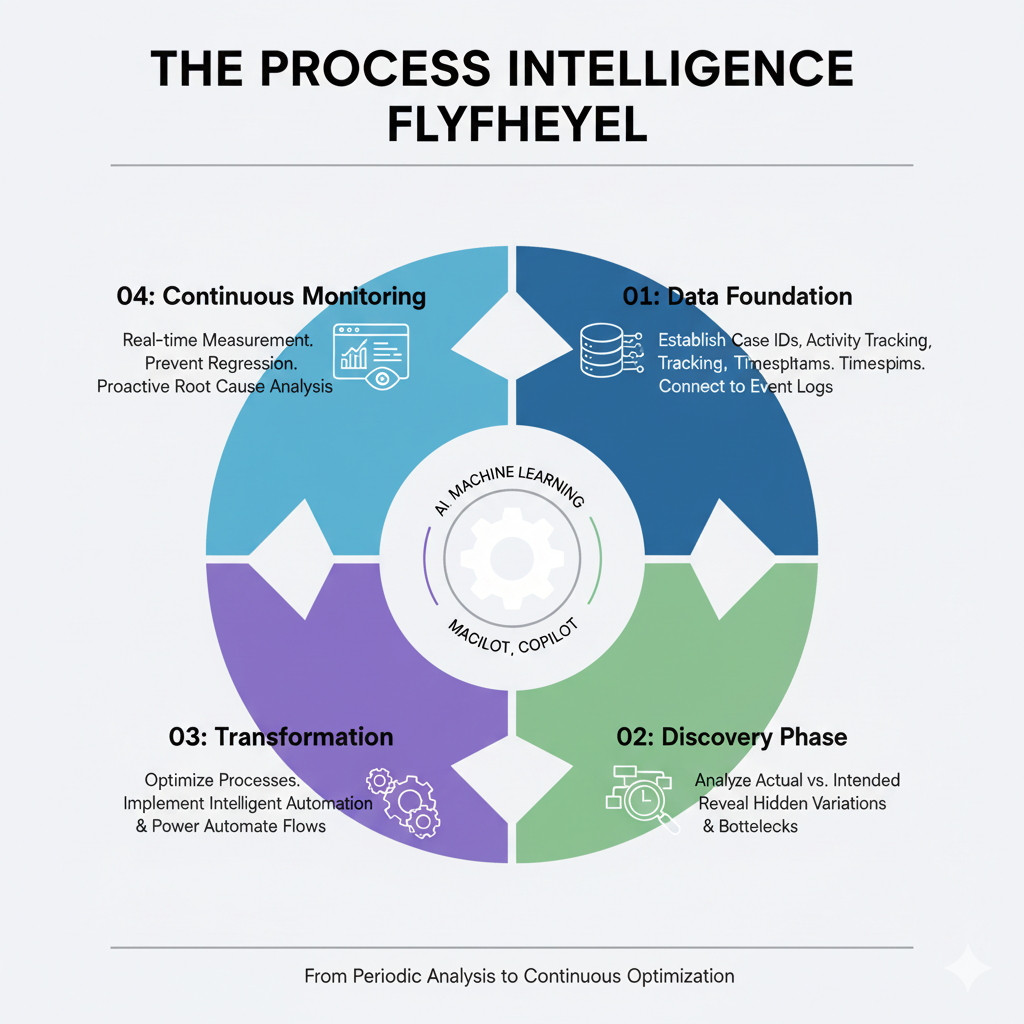PPCC Keynote: Microsoft Fabric: The Game-Changing Platform Transforming Enterprise Data Culture for the AI Era

In today's rapidly evolving business landscape, organizations face an overwhelming challenge: transforming fragmented data ecosystems into unified, AI-ready platforms that drive real business value. At Microsoft's recent Power Platform Community Conference, groundbreaking developments in Microsoft Fabric revealed how forward-thinking companies are solving the complex data integration puzzle that has plagued enterprises for decades.
The Hidden Cost of Data Fragmentation
According to analysis from Firstmark Capital, the modern data and AI landscape consists of hundreds of individual tools, each creating integration points that demand ongoing management, additional licensing costs, and complex security implementations. This fragmentation forces teams to spend disproportionate time managing integrations rather than generating actionable insights.
For automation companies like FlowDevs.io, this complexity represents both a challenge and an opportunity. Traditional approaches to data integration involve costly ETL processes, multiple vendor relationships, and endless maintenance overhead. Microsoft Fabric emerges as a comprehensive solution that mirrors the successful Microsoft Office approach—providing specialized tools for specific functions while maintaining shared foundations.
Zero-ETL Connectivity: The Future of Data Integration
The most revolutionary advancement in modern data platforms is zero-ETL connectivity through advanced shortcut capabilities. Instead of building complex extraction, transformation, and loading pipelines, organizations can now create direct connections to data wherever it lives—without moving it.
Consider the SharePoint challenge that virtually every organization faces. Business users prefer their Excel files and CSV documents stored in SharePoint document libraries. Rather than forcing adoption of unfamiliar database systems, modern shortcut technologies allow data teams to create direct table connections to SharePoint folders with just a few clicks:
- Navigate directly through SharePoint folder structures
- Automatically detect and transform CSV files into queryable tables
- Enable real-time data updates without manual intervention
When new product information gets uploaded to the SharePoint folder, it automatically appears in the data lake—no ETL processes, no refresh schedules, no data movement required.
AI-Powered Unstructured Data Processing
Unstructured data presents an even greater challenge for most organizations. Email threads, text documents, and other unstructured content have traditionally been nearly impossible to analyze alongside structured database information. However, AI-powered data processing is revolutionizing this landscape.
Modern platforms can now connect directly to cloud storage containing unstructured data and apply AI transformations during the connection process. When connecting to an S3 bucket full of email text files, organizations can automatically apply:
- Sentiment analysis
- PII detection
- Language translation
- Content classification
This means unstructured email data transforms into structured, analyzable information with sentiment scores and metadata—all without moving original files or setting up complex processing pipelines.
OneLake: The OneDrive for Data
OneLake represents a paradigm shift in data management, positioning itself as the "OneDrive for data." This concept addresses data sharing complexity by providing:
- Single SaaS data lake for entire organizations
- Open format standardization enabling cross-platform compatibility
- Centralized security and governance with distributed access
- Simplified data sharing eliminating technical barriers
OneLake's momentum demonstrates market validation, with 350% year-over-year storage growth indicating strong adoption and value realization.
Real-World Success Stories Driving ROI
Galya Foods: From 24 Days to 1 Day Reporting
Galya Foods, a dairy farming cooperative, exemplifies Fabric's transformative potential. Previously struggling with fragmented data and inconsistent reporting, their Fabric and Copilot implementation reduced key report generation time from 24 days to just one day, while enabling previously impossible AI-driven insights.
SuperBet: $70,000 Annual Savings Through Integration
SuperBet, a rapidly growing global online retail betting company, unified their operations across Dynamics, Power Platform, Azure, and Microsoft Fabric. This integration delivered remarkable results:
- 75% reduction in audit processing time
- $70,000 annual savings through improved efficiency
- Streamlined operations across multiple Microsoft platforms
The Conversational Data Revolution
The future of business intelligence is conversational, intelligent, and deeply integrated with daily workflows. Power BI's new chat-with-data capabilities represent a fundamental shift from traditional dashboard navigation to natural language data interaction.
Power BI Apps: Democratizing Data Access
With over one-third of Power BI users accessing the platform exclusively through apps, conversational AI integration represents massive opportunity for organizations to deliver curated, intelligent data experiences. Instead of clicking through multiple reports, users leverage Copilot to receive executive overviews, summaries, and specific data points through natural language queries.
Verified Answers: Building Trust Through Automation
When business analysts create curated responses for common questions, these verified answers appear prominently in chat interactions, building trust between users and the system. This ensures that when someone asks about bike utilization rates by neighborhood or product NPS scores, they receive the exact visual and formatting that analysts have determined to be most accurate and useful.
Market Leadership and Adoption Metrics
Microsoft Fabric's comprehensive approach has achieved recognition as a leader across all four relevant Gartner Magic Quadrants. Since becoming generally available, adoption metrics showcase significant market traction:
- Over 25,000 customers actively using Microsoft Fabric
- 80% of Fortune 500 companies have adopted the platform
- 50% of customers utilizing three or more workloads beyond Power BI
- Over 550,000 customers actively using Power BI
Strategic Implementation for Automation Companies
For automation companies looking to leverage these capabilities, several best practices emerge:
Start with Shortcuts
Identify high-value data sources that can be connected via shortcuts rather than traditional ETL processes. This reduces infrastructure costs while increasing agility.
Leverage Existing Semantic Models
Build on existing business context rather than starting from scratch. With over 20 million active semantic models and 7 million creators working on them daily, these curated data models represent enormous repositories of business intelligence.
Embrace Web-First Development
Reduce tool complexity by standardizing on browser-based development environments. Modern platforms now support end-to-end content authoring entirely in web browsers, from data connection through semantic model building to report creation.
Plan for AI Integration
Design data models with AI consumption in mind from the beginning. AI is only as good as the context it's provided, which is where semantic models become essential.
The Three Phases of Data Culture Transformation
Microsoft's approach to enabling business users to interact naturally with data involves three critical phases:
Phase 1: Bringing Data Together - Data integration remains the foundational challenge, as organizational data typically exists across Microsoft cloud services, Google and AWS platforms, on-premises infrastructure, and various SaaS applications.
Phase 2: Curating Data for AI - Raw data integration alone is insufficient for AI success. Organizations must ensure AI systems are grounded in relevant business context, requiring data practitioners and subject matter experts to curate and prepare data specifically for AI consumption.
Phase 3: Discovering Insights Where Work Happens - The final phase focuses on making insights accessible within existing workflows and business processes, ensuring data investments translate into actionable business outcomes.
The Future of Intelligent Business Automation
The convergence of conversational AI, business intelligence, and workflow automation represents a fundamental shift in how organizations operate. Rather than requiring users to learn complex software interfaces, intelligent agents understand natural language queries and deliver precise, contextual responses.
Microsoft Fabric's success metrics, partner ecosystem strength (over 135,000 trained consultants and 250 Fabric Featured Partners), and customer adoption patterns demonstrate market validation for unified data platforms. For organizations seeking to establish AI-ready data cultures, Fabric provides the foundation necessary to move beyond integration complexity toward insight generation and business value creation.
As businesses continue navigating AI transformation, successful organizations will be those that establish robust, unified data foundations capable of fueling AI applications while empowering business users to interact naturally with data through conversational interfaces. The future belongs to organizations that can successfully balance automation with human insight, democratization with governance, and innovation with reliability.
For automation companies and their clients, this represents an unprecedented opportunity to focus on business logic and value creation rather than data plumbing and infrastructure management. The future of data integration is here, and it's simpler, faster, and more intelligent than ever before.
In today's rapidly evolving business landscape, organizations face an overwhelming challenge: transforming fragmented data ecosystems into unified, AI-ready platforms that drive real business value. At Microsoft's recent Power Platform Community Conference, groundbreaking developments in Microsoft Fabric revealed how forward-thinking companies are solving the complex data integration puzzle that has plagued enterprises for decades.
The Hidden Cost of Data Fragmentation
According to analysis from Firstmark Capital, the modern data and AI landscape consists of hundreds of individual tools, each creating integration points that demand ongoing management, additional licensing costs, and complex security implementations. This fragmentation forces teams to spend disproportionate time managing integrations rather than generating actionable insights.
For automation companies like FlowDevs.io, this complexity represents both a challenge and an opportunity. Traditional approaches to data integration involve costly ETL processes, multiple vendor relationships, and endless maintenance overhead. Microsoft Fabric emerges as a comprehensive solution that mirrors the successful Microsoft Office approach—providing specialized tools for specific functions while maintaining shared foundations.
Zero-ETL Connectivity: The Future of Data Integration
The most revolutionary advancement in modern data platforms is zero-ETL connectivity through advanced shortcut capabilities. Instead of building complex extraction, transformation, and loading pipelines, organizations can now create direct connections to data wherever it lives—without moving it.
Consider the SharePoint challenge that virtually every organization faces. Business users prefer their Excel files and CSV documents stored in SharePoint document libraries. Rather than forcing adoption of unfamiliar database systems, modern shortcut technologies allow data teams to create direct table connections to SharePoint folders with just a few clicks:
- Navigate directly through SharePoint folder structures
- Automatically detect and transform CSV files into queryable tables
- Enable real-time data updates without manual intervention
When new product information gets uploaded to the SharePoint folder, it automatically appears in the data lake—no ETL processes, no refresh schedules, no data movement required.
AI-Powered Unstructured Data Processing
Unstructured data presents an even greater challenge for most organizations. Email threads, text documents, and other unstructured content have traditionally been nearly impossible to analyze alongside structured database information. However, AI-powered data processing is revolutionizing this landscape.
Modern platforms can now connect directly to cloud storage containing unstructured data and apply AI transformations during the connection process. When connecting to an S3 bucket full of email text files, organizations can automatically apply:
- Sentiment analysis
- PII detection
- Language translation
- Content classification
This means unstructured email data transforms into structured, analyzable information with sentiment scores and metadata—all without moving original files or setting up complex processing pipelines.
OneLake: The OneDrive for Data
OneLake represents a paradigm shift in data management, positioning itself as the "OneDrive for data." This concept addresses data sharing complexity by providing:
- Single SaaS data lake for entire organizations
- Open format standardization enabling cross-platform compatibility
- Centralized security and governance with distributed access
- Simplified data sharing eliminating technical barriers
OneLake's momentum demonstrates market validation, with 350% year-over-year storage growth indicating strong adoption and value realization.
Real-World Success Stories Driving ROI
Galya Foods: From 24 Days to 1 Day Reporting
Galya Foods, a dairy farming cooperative, exemplifies Fabric's transformative potential. Previously struggling with fragmented data and inconsistent reporting, their Fabric and Copilot implementation reduced key report generation time from 24 days to just one day, while enabling previously impossible AI-driven insights.
SuperBet: $70,000 Annual Savings Through Integration
SuperBet, a rapidly growing global online retail betting company, unified their operations across Dynamics, Power Platform, Azure, and Microsoft Fabric. This integration delivered remarkable results:
- 75% reduction in audit processing time
- $70,000 annual savings through improved efficiency
- Streamlined operations across multiple Microsoft platforms
The Conversational Data Revolution
The future of business intelligence is conversational, intelligent, and deeply integrated with daily workflows. Power BI's new chat-with-data capabilities represent a fundamental shift from traditional dashboard navigation to natural language data interaction.
Power BI Apps: Democratizing Data Access
With over one-third of Power BI users accessing the platform exclusively through apps, conversational AI integration represents massive opportunity for organizations to deliver curated, intelligent data experiences. Instead of clicking through multiple reports, users leverage Copilot to receive executive overviews, summaries, and specific data points through natural language queries.
Verified Answers: Building Trust Through Automation
When business analysts create curated responses for common questions, these verified answers appear prominently in chat interactions, building trust between users and the system. This ensures that when someone asks about bike utilization rates by neighborhood or product NPS scores, they receive the exact visual and formatting that analysts have determined to be most accurate and useful.
Market Leadership and Adoption Metrics
Microsoft Fabric's comprehensive approach has achieved recognition as a leader across all four relevant Gartner Magic Quadrants. Since becoming generally available, adoption metrics showcase significant market traction:
- Over 25,000 customers actively using Microsoft Fabric
- 80% of Fortune 500 companies have adopted the platform
- 50% of customers utilizing three or more workloads beyond Power BI
- Over 550,000 customers actively using Power BI
Strategic Implementation for Automation Companies
For automation companies looking to leverage these capabilities, several best practices emerge:
Start with Shortcuts
Identify high-value data sources that can be connected via shortcuts rather than traditional ETL processes. This reduces infrastructure costs while increasing agility.
Leverage Existing Semantic Models
Build on existing business context rather than starting from scratch. With over 20 million active semantic models and 7 million creators working on them daily, these curated data models represent enormous repositories of business intelligence.
Embrace Web-First Development
Reduce tool complexity by standardizing on browser-based development environments. Modern platforms now support end-to-end content authoring entirely in web browsers, from data connection through semantic model building to report creation.
Plan for AI Integration
Design data models with AI consumption in mind from the beginning. AI is only as good as the context it's provided, which is where semantic models become essential.
The Three Phases of Data Culture Transformation
Microsoft's approach to enabling business users to interact naturally with data involves three critical phases:
Phase 1: Bringing Data Together - Data integration remains the foundational challenge, as organizational data typically exists across Microsoft cloud services, Google and AWS platforms, on-premises infrastructure, and various SaaS applications.
Phase 2: Curating Data for AI - Raw data integration alone is insufficient for AI success. Organizations must ensure AI systems are grounded in relevant business context, requiring data practitioners and subject matter experts to curate and prepare data specifically for AI consumption.
Phase 3: Discovering Insights Where Work Happens - The final phase focuses on making insights accessible within existing workflows and business processes, ensuring data investments translate into actionable business outcomes.
The Future of Intelligent Business Automation
The convergence of conversational AI, business intelligence, and workflow automation represents a fundamental shift in how organizations operate. Rather than requiring users to learn complex software interfaces, intelligent agents understand natural language queries and deliver precise, contextual responses.
Microsoft Fabric's success metrics, partner ecosystem strength (over 135,000 trained consultants and 250 Fabric Featured Partners), and customer adoption patterns demonstrate market validation for unified data platforms. For organizations seeking to establish AI-ready data cultures, Fabric provides the foundation necessary to move beyond integration complexity toward insight generation and business value creation.
As businesses continue navigating AI transformation, successful organizations will be those that establish robust, unified data foundations capable of fueling AI applications while empowering business users to interact naturally with data through conversational interfaces. The future belongs to organizations that can successfully balance automation with human insight, democratization with governance, and innovation with reliability.
For automation companies and their clients, this represents an unprecedented opportunity to focus on business logic and value creation rather than data plumbing and infrastructure management. The future of data integration is here, and it's simpler, faster, and more intelligent than ever before.
Related Blog Posts

The Champion's Mindset: How Olympic Excellence Principles Drive Success in Automation and AI (PPCC Keynote)

PPCC: The Process Intelligence Revolution: How Modern Enterprises Are Transforming Operations with AI-Powered Process Mining


.jpg)